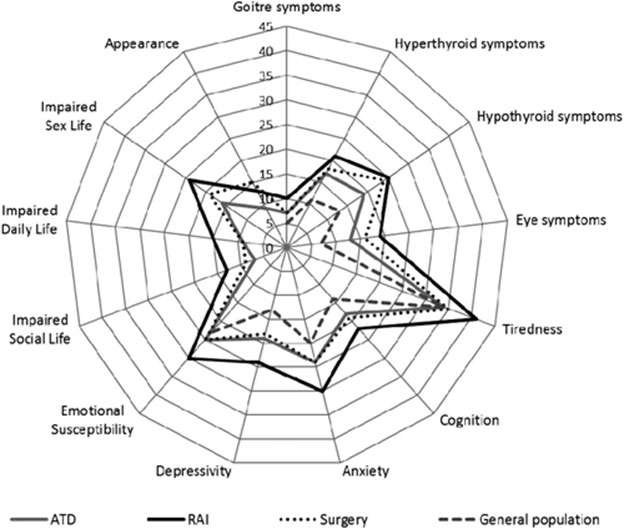Thyroid Surgery Graves Disease
Find your care
We deliver effective, minimally invasive treatments in a caring environment. Call 310-267-7838 to connect with an expert in endocrine surgery.
Graves’ disease
Graves’ disease is the most common form of hyperthyroidism (an overactive thyroid gland) in the U.S. and worldwide.
It is an autoimmune disease, in which the immune system stimulates the thyroid to overproduce thyroid hormones. In addition to symptoms of hyperthyroidism, Graves’ disease can be associated with thyroid eye disease symptoms, such as swelling, redness, and bulging of the eyes.
Update in Graves’ Disease
UCLA endocrine surgeons Masha Livhits, MD & James Wu, MD, presented a webinar to discuss updates in Graves’ Disease.

FIG. 1. Mean Thyroid-Related Patient-Reported Outcome (ThyPRO) questionnaire scale scores, adjusted for sex and age among patients with Graves' disease, treated with antithyroid drugs (ATD), radioactive iodine (RAI), or surgery, as well as scores from a general population sample. Patients in the RAI group may have received ATD but not surgery. Patients were allocated to the surgery group if they had received thyroid surgery, irrespective of previous ATD or RAI treatment. Items in four scales (impaired social life, impaired daily life, impaired sex life, and appearance) are asked with attribution to thyroid disease and cannot be answered by respondents from the general population. Scale scores range from 0 to 100, with higher scores indicating worse health status.
More from Pubmed.
Preparation Before Surgery
Toxic solitary nodule or multinodular goiter
These can be treated with radioactive iodine or surgery. For patients who refuse both, patients can be given long-term thionamides. Surgery is recommended for toxic nodules or multinodular goiters when:
- Presence of large goiter
- Patient has compressive symptoms
- Patient also has thyroid malignancy
- Patients who do not desire radioactive iodine
Large Goiters
Any enlargement of the thyroid gland is referred to as a “goiter.” Goiter can be caused by Hashimoto’s Thyroiditis (an autoimmune disease) and iodine deficiency. These do not require treatment unless the goiter is causing compressive or hyperthyroid symptoms.